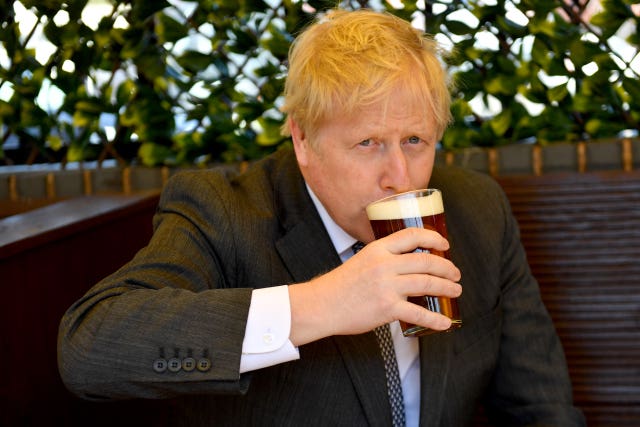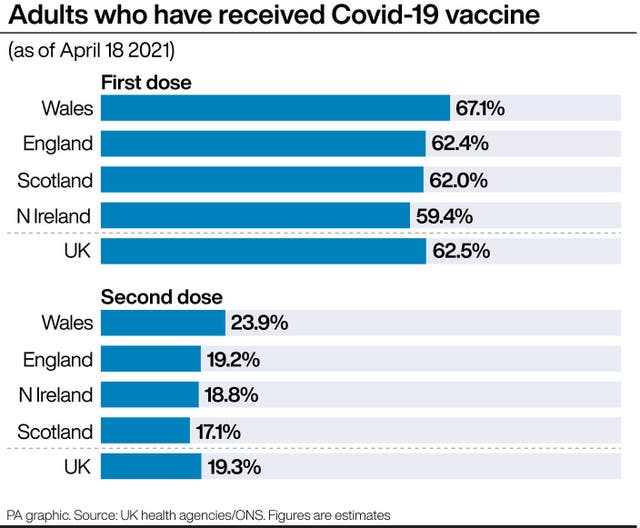More than 10 million people in UK given second Covid vaccine dose
The Department of Health and Social Care said health services administered a total of 43,084,487 million vaccines between December 8 and April 18.

More than 10 million people in the UK have now received their second dose of a Covid-19 vaccine, according to Government figures.
The milestone means that more than 19% of all adults in the country have received both jabs, the Department of Health and Social Care (DHSC) said.
Official data shows that so far, second doses have been administered to 8,518,498 people in England and 757,115 in Scotland.
In Wales, 602,807 people have received their second jab, and in Northern Ireland, 273,619.
This brings the total number of people receiving second doses across the UK to 10,152,039.
Prime Minister Boris Johnson said: “Vaccines offer us the best possible protection from the virus, so it is fantastic that 10 million people have now received their second dose.
“This is another remarkable milestone in our vaccination programme, which has already saved thousands of lives.
“I want to thank the brilliant staff and volunteers involved in the rollout, and urge all those who are called to keep coming forward.”
DHSC said that health services across the UK administered a total of 43,084,487 million vaccines between December 8 and April 18, including 32,932,448 people receiving their first dose.
Health Secretary Matt Hancock hailed the “terrific” second dose milestone which he said meant “over 10 million people who are the most vulnerable to Covid in the UK now have double protection from this awful virus”.
He added: “Second doses are crucial to maximising the strength and duration of your protection from Covid-19 and I’m urging everybody eligible to get their jab as soon as possible.
“This milestone is thanks to the dedication and tireless efforts of our NHS workers, volunteers, civil servants and everybody working on the front line to save lives and stop this virus in its tracks.”
In a video message posted on Twitter, Mr Johnson later said the “very successful” vaccination programme had partly contributed to lockdown measures being eased.
The Prime Minister revealed that on Monday he had visited a pub in Tettenhall, Wolverhampton, and “after months and months and months” was able to “raise a pint cautiously, but irreversibly, to my lips, outdoors and to drink it”.
He said millions of people were able to enjoy some of the “freedoms” returning since measures were relaxed on April 12, which he hoped would be followed by the opening up of indoor hospitality on May 17.
Mr Johnson added: “But it’s also very important to understand that our success is determined as well and very largely by the discipline of the lockdown and the discipline with which everybody has continued to follow sensible measures to prevent transmission of the virus.”

Sir Simon Stevens, NHS chief executive, also praised the “major achievement” for the health service’s vaccination programme.
“Since England’s NHS became the first health service anywhere in the world to administer a Covid-19 vaccine, the programme has gone from strength to strength, with everyone in the top priority groups given the opportunity to get jabbed ahead of target,” he added.
“The success of the NHS vaccination programme is not a happy accident. It is down to careful planning coupled with the sheer hard work and determination of doctors, nurses and countless other staff ably assisted by volunteers and many others.”

There are currently three vaccines approved for use in the UK, those developed by Pfizer, AstraZeneca and Moderna.
Regulators in the UK have recommended as a precautionary measure that people aged 18 to 29 should be offered alternatives to the AstraZeneca vaccine, saying there is a possible link between the jab and “extremely rare” blood clots.
However, the Medicines and Healthcare products Regulatory Agency (MHRA) has said the benefits of the AstraZeneca vaccine continue to far outweigh any risks.
The UK’s medicines regulator is also conducting rolling reviews of the Janssen and Novavax vaccines, which are yet to receive official approval.





